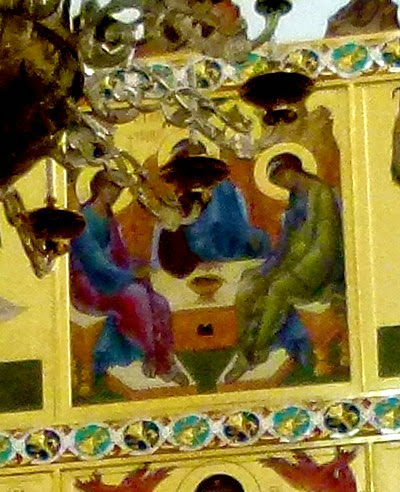The Churches
With the demise of Communism, religion seems to have reasserted itself on a grand scale; aided and abetted by Putin who uses it to consolidate his power base.
After various tours of churches; in which we were invited to think that the restoration of services was a good thing and/or that there really were such people as saints; I asked a couple of guides what their personal beliefs were, to be told that they were sceptics. So, I conclude that, in part, this renewed religiosity is a front that the 'New Russia' wants to present to tourists - particularly Americans.
But it is not all 'front'. The last Tsar and his murdered family have all been sanctified (individually) and now have churches built in their names. Churches previously made into museums or social centres are restored to their previous use and hundreds of (mainly) women, many bizarrely, in mini-skirts or jeans (scarfs on heads), queue to kiss an icon, Our Lady of Kazan, in Kazan Cathedral in St Petersburg.
Kissing the icon
The Russian Orthodox church is in the Eastern Tradition and differs from the Roman Church and its descendants in its view of the Trinity. This can be seen in the repeated representation of the 'Old Testament Trinity' in and around its churches. God can't be represented directly, so three angels who visited Abraham (Genesis 18:1-15) appear in proxy.

The top centre frame of an Iconostasis (partly obscured by the chandelier)
In this tradition Jesus was that part of God who became a man, briefly, before returning to re-join the Trinity. This gets around the problem of why God waited 13.7 billion years after the initial creation, and around 100,000 years after creating Man, before deciding to have a human son; and only then splitting himself into three attributes.
As a consequence, the Russian Orthodox Church has a different view of apotheosis. In the Roman tradition apotheosis is the goal of all believers (to be one with God); also described as divinization or deification.
Latin Christianity clearly has its roots in the earlier pagan beliefs that a dead (or sometimes living) person, for example an emperor or other prominent person, could be recognised as divine by election of the Roman Senate and popular acclaim; this in turn from earlier Hellenistic traditions; where heroes were often, retrospectively, found to be the children of gods. Similar traditions can be found in Egypt and in Hindu and Chinese cultures. In my earlier notes on out trip to India I noted how many of the Hindu Princes are typically the decedents of gods; the avatars of gods; or the representatives of gods.
In the Latin tradition Saints still need to be endorsed / recognised / canonised by Rome (the Vatican - not the Senate). Supporters of Mother Teresa of Calcutta are still waiting; but Rome was once less abstemious.
In Hexham Abbey (in Northern England) from 647 to 789AD nine of the ten 'early rulers', were canonised. Today bishops have only a one in thirty chance to make it to Cardinal; let alone to Saint. And what did poor Trumbrith do to miss out? It's like not getting the Public Service Medal.

Hexham Abbey - Early Rulers
In contrast the Eastern Church talks of 'theosis'. Humans can't become 'one with God' or divine but can only achieve 'likeness to God'. Many saints and mystics have achieved this; usually by the purification of mind and body (katharsis). Through their spiritual insights the faithful may follow. Thus, Eastern churches are festooned with images of saints; each of whom may assist the faithful to attain theosis.
The Iconostasis in an historic church
We were told that during the Soviet period Kazan Cathedral was used as a 'museum of atheism'; although I'm not sure how one does that - it's difficult to depict nothing. But it's obviously a trivial thing to catalogue mankind's many bizarre religious beliefs, be they polytheistic or monotheistic; so, I suppose that this is what was done.
Another icon of Our Lady of Kazan - this one in a museum
It seems the Russians may have thrown out at least one baby with the Marxist bathwater.
